小学英语毕业总复习
小学英语毕业班总复习(PEP)

Difficulty Analysis and Breakthrough
Difficulty Analysis: The book is designed to gradually increase the difficulty level as students progress through the chapters. The early chapters focus on basic language skills, while later chapters introduce more challenging vocabulary, sentence structures, and grammar rules.
Model Test
Model Test 1
01
02
基础知识点考查
主要测试学生对英语基础知识的掌握程度 ,包括词汇、语法和l Test 2
阅读理解能力
05
06
通过多篇阅读材料,评估学生的阅读速度 、理解能力和逻辑分析能力。
Simulated Test Question
培养阅读技巧
阅读理解能力是英语学习中不可或缺的一部分。为了提高阅读理解能力,学生需要掌握各种阅读技巧,如快速阅读、寻找主 题句、推断作者意图等。此外,学生还应该注重阅读材料的多样性和深度,以培养阅读兴趣和拓宽知识面。
Developing writing skills
多写多练
写作技能是英语学习中不可或缺的一部分。学生需要通过多 写多练来提高写作技能,注重文章的逻辑性和表达的准确性 。此外,学生还应该学习各种写作技巧,如段落组织、句子 结构、修辞手法等,以提升写作水平。
Answer Analysis and Ideas Guidance
小学英语总复习资料(新版PEP)
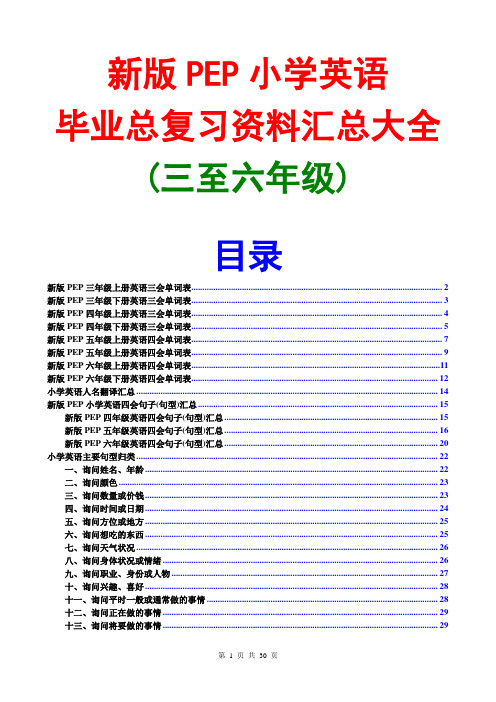
新版PEP小学英语毕业总复习资料汇总大全(三至六年级)目录新版PEP三年级上册英语三会单词表 (2)新版PEP三年级下册英语三会单词表 (3)新版PEP四年级上册英语三会单词表 (4)新版PEP四年级下册英语三会单词表 (5)新版PEP五年级上册英语四会单词表 (7)新版PEP五年级上册英语四会单词表 (9)新版PEP六年级上册英语四会单词表 (11)新版PEP六年级下册英语四会单词表 (12)小学英语人名翻译汇总 (14)新版PEP小学英语四会句子(句型)汇总 (15)新版PEP四年级英语四会句子(句型)汇总 (15)新版PEP五年级英语四会句子(句型)汇总 (16)新版PEP六年级英语四会句子(句型)汇总 (20)小学英语主要句型归类 (22)一、询问姓名、年龄 (22)二、询问颜色 (23)三、询问数量或价钱 (23)四、询问时间或日期 (24)五、询问方位或地方 (25)六、询问想吃的东西 (25)七、询问天气状况 (26)八、询问身体状况或情绪 (26)九、询问职业、身份或人物 (27)十、询问兴趣、喜好 (28)十一、询问平时一般或通常做的事情 (28)十二、询问正在做的事情 (29)十三、询问将要做的事情 (29)新版PEP三年级上册英语三会单词表Unit 1pen 钢笔pencil 铅笔pencil-case 铅笔盒ruler 尺子eraser 橡皮crayon 蜡笔book 书bag 书包sharpener 卷笔刀school 学校Unit 2head 头face 脸nose 鼻子mouth 嘴eye 眼睛ear 耳朵arm 胳膊finger 手指leg腿foot 脚body 身体Unit3red 红色的yellow 黄色的green 绿色的blue 蓝色的purple 紫色的white 白色的black 黑色的orange 橙色的pink 粉色的brown 棕色的Unit 4cat 猫dog 狗monkey 猴子panda 熊猫rabbit 兔子duck 鸭子pig 猪bird 鸟bear 熊elephant 大象mouse 老鼠squirrel 松鼠Unit 5cake 蛋糕bread 面包hot dog 热狗hamburger 汉堡包chicken 鸡肉French fries 炸薯条Coke 可乐juice 果汁milk 牛奶water 水tea 茶coffee 咖啡Unit 6one 一two 二three 三four 四five 五six 六seven 七eight 八nine 九ten 十doll 玩具娃娃boat 小船ball 球kite 风筝balloon 气球car 小汽车plane 飞机新版PEP三年级下册英语三会单词表Unit 1boy 男孩girl 女孩teacher 教师student 学生this 这个my 我的friend 朋友I’m=I am 我是nice 好的;愉快的good morning 早上好good afternoon 下午好meet 遇见;碰见goodbye 再见too 也;太Unit 2father 父亲;爸爸dad 爸爸(口语)mother 母亲;妈妈mom 妈妈(口语)man男人woman 女人grandmother (外)祖母grandma (口语)(外)祖母grandfather (外)祖父grandpa (口语)(外)祖父sister 姐妹brother 兄弟let’s=let us 让我们great 太好了really 真地;确切地and 和;并且how 多么;怎么样Unit 3eleven 十一twelve 十二thirteen 十三fourteen 十四fifteen 十五sixteen 十六seventeen 十七eighteen 十八nineteen 十九twenty 二十how many 多少can 能够;可以look at 看;瞧Unit 4peach 桃pear 梨orange 橙子watermelon 西瓜apple 苹果banana 香蕉strawberry 草莓grape 葡萄like 喜欢some 一些;某些thanks 多谢Unit 5bus 公共汽车bike 自行车taxi 出租车jeep 吉普车desk 课桌chair 椅子walkman 随身听lamp 台灯your 你的;你们的zoo 动物园Unit 6small 小的big 大的long 长的short 短的;矮的tall 高的giraffe 长颈鹿deer 鹿新版PEP四年级上册英语三会单词表Unit 1window(窗户) board(板) light(灯) picture(图片) door(门) floor(地板) classroom (教室) computer(电脑) teacher’s desk(讲台) wall(墙) fan(扇子)Unit 2bag(包) pencil(铅笔) pen(钢笔) book (书) ruler(尺子) pencil-case(铅笔盒)Unit 3teacher(教师) student(学生) boy(男孩) girl(女孩) friend(朋友)Unit 4home(家) room(房间) school(学校) classroom(教室)window(窗户) desk(课桌;书桌) door(门) chair(椅子) bed(床)Unit 5rice(米饭) beef(牛肉) bread(面包) milk(牛奶) egg(蛋)water(水) chicken(鸡肉) fish(鱼)Unit 6sister(姐妹) brother(兄弟) father(父亲;爸爸) mother(母亲;妈妈)driver(司机) doctor(医生) farmer(农民) nurse(护士)新版PEP四年级下册英语三会单词表Unit 1computer(计算机) board(写字板) fan(风扇) light(灯)this(这;这个) is(是) my(我的) that(那;那个) your(你的)teacher’s desk(讲台) picture(图画;照片) wall(墙壁) floor(地板) yes(是;是的) it(它)Unit 2one(一) two(二) three(三) four(四) five(五) six(六) seven(七) eight(八) nine(九) ten(十) what(什么) time(时间)it’s=it is …o’clock(…点钟) math(数学) Chinese(语文) English(英语) P.E(体育) music(音乐) for(为;给) class(课程)Unit 3jacket(夹克衫) shirt(衬衫) skirt(裙子) dress(连衣裙)T-shirt(T恤衫) red(红色的) blue(蓝色的) yellow(黄色的)green(绿色的) white(白色的) no(不;不是) not(不;不是的) color(颜色)Unit 4warm(暖和的) cold(寒冷的) cool(凉爽的) today(今天)jeans(牛仔裤) pants(长裤) socks(袜子) shoes(鞋子) let’s=let us play(玩;踢) football(足球) snowy(下雪的) sunny(晴朗的)Unit 5how much(多少钱) big(大的) small(小的) long(长的) short(短的) apple(苹果) banana(香蕉) pear(梨) orange(橙子) watermelon(西瓜) are(是) they 它(他、她)们Unit 6horse(马) aren’t=are not cat(猫) rabbit(兔子) pig(猪) duck(鸭子) dog(狗) eleven(十一) twelve(十二) thirteen(十三) fifteen(十五) twenty(二十) how many(多少) there(那儿;那里)新版PEP五年级上册英语四会单词表Unit 1young (年轻的)funny (滑稽可笑的)tall (高的)strong (强壮的)kind (和蔼的;亲切的)old (年老的)short (矮的)thin (瘦的)Mr (先生)like (像;喜欢)strict (严格的)smart (聪明的;巧妙的)active (积极的;活跃的)quiet (安静的;文静的)very (很;非常)but (但是)Unit 2Monday (星期一)Tuesday (星期二)Wednesday (星期三)Thursday (星期四)Friday (星期五)Saturday (星期六)Sunday (星期天)day (天;日子)have (有;吃)on (在…..时候)do homework (做作业)watch TV (看电视)read books (读书)Unit 3eggplant (茄子)fish (鱼)green beans (青豆)tofu (豆腐)potato (土豆)tomato (西红柿)for (为;给)lunch (中餐;午饭)we (我们)tasty (好吃的)sweet (甜的)sour (酸的)fresh (新鲜的)salty (咸的)favorite (最喜爱的;特别喜爱的)they are (他们是)fruit (水果)grape (葡萄)Unit 4cook the meals (做饭)water the flowers (浇花)sweep the floor (扫地)clean the bedroom (打扫卧室)make the bed (铺床)set the table (摆饭桌)wash the clothes (洗衣服)do the dishes (洗碗碟)use a computer (使用计算机)empty the trash (倒垃圾)Unit 5curtain (窗帘)trash bin (垃圾箱)closet (衣柜)mirror (镜子)end table (床头柜)bedroom (卧室)kitchen (厨房)bathroom (卫生间)living room (客厅)in (在…里面)on (在…上面)under (在…下面)near (在..旁边)behind (在…后边)clothes (衣服)Unit 6river (河流)flower (花)grass (草)lake (湖泊)forest (森林)path (路)park (公园)picture (照片)house (房子)bridge (桥)tree (树)road (公路)building (建筑物)clean (干净的)新版PEP五年级上册英语四会单词表Unit 1do morning exercises(晨练)eat breakfast(吃早饭)have English class(上英语课)play sports(进行体育运动)eat dinner(吃晚饭)when(什么时候)evening(夜晚;晚上)get up(起床)at(在…点钟)usually(通常;一般)noon(中午)climb mountains(爬山)go shopping(购物;买东西)play the piano(弹钢琴)visit grandparents(看望祖父母)go hiking(去远足)weekend(周末)often(经常)sometimes(有时候)Unit 2spring(春天)summer(夏天)fall(秋天)winter(冬天)season季节)which(哪一个)best(最;极)swim(游泳)fly kites(放风筝)skate(滑冰;滑冰鞋)make a snowman(堆雪人)plant trees(种树)why(为什么)because (因为)sleep(睡觉)Unit 3Jan./January(一月)Feb./February(二月)Mar./March(三月)Apr./April(四月)May(五月)June(六月)July(七月)Aug./August(八月)Sept./September(九月)Oct./October (十月)Nov./November(十一月)Dec./December(十二月)birthday(生日)uncle(叔叔;舅舅)her(她的)date(日期)Unit 4draw pictures(画画)cook dinner(做饭)read a book(看书)answer the phone(接电话)listen to music(听音乐)clean the room(打扫房间)write a letter(写信)write an e-mail(写电子邮件)mom(妈妈)grandpa(爷爷;外公)study (书房)Unit 5fly(飞)jump(跳)walk(走)run(跑)swim(游泳)kangaroo(袋鼠)sleep(睡觉)climb(往上爬)fight(打架)swing(荡;荡秋千)drink water(喝水)Unit 6take pictures(照相)watch insects(观察昆虫)pick up leaves(采摘树叶)do an experiment(做实验)catch butterfly(捉蝴蝶)honey(蜂蜜)count insects(数昆虫)collect leaves(收集树叶)write a report(写报告)play chess(下棋)have a picnic(举行野餐)新版PEP六年级上册英语四会单词表Unit 1by (经,乘) foot(脚) bike(自行车) bus(公共汽车) train(火车) how(怎样) go to school(上学)traffic(交通)traffic light(交通灯)traffic rule(交通规则)stop(停,停车站)wait(等待)get to(到达)Unit 2library(图书馆) post office(邮局) hospital(医院) cinema(电影院) turn(转弯) bookstore(书店) where(在哪里,到哪里) please(请) next to(与…相邻) right (右边) left(左边) straight(成直线地) then (然后)Unit 3next week(下周) this morning(今天上午) this afternoon(今天下午)this evening (今天晚上) comic book(漫画书) post card(明信片) newspaper(报纸) buy(购买)Unit 4hobby(爱好) ride a bike--riding a bike(骑自行车) dive--diving(跳水)play the violin—playing the violin(拉小提琴)make kites—making kites(制作风筝)collect stamps—collecting stamps(集邮) live –lives(居住) teach--teaches(教) go--goes(去) watch--watches(看) read--reads(读,看) does doesn’t=does notUnit 5singer(歌唱家,歌手) writer(作家) actor(男演员) actress(女演员) artist(画家) TV reporter(电视台记者) engineer(工程师) accountant(会计) policeman(男警察) salesperson(销售员)cleaner(清洁工) where(在哪里,到哪里)work(工作)Unit 6rain(雨) cloud (云) sun(太阳) stream(河,溪) come from(来自,从…来) seed(种子) soil(土壤) sprout (苗,芽) plant(植物,种植) should (应该) then(然后)新版PEP六年级下册英语四会单词表Unit 1tall—taller更高的short—shorter 更矮的strong—stronger 更强壮的old—older 年龄更大的young—younger 更年轻的big—bigger 更大的heavy—heavier 更重的long—longer 更长的thin—thinner 更瘦的small—smaller (体型)更小的Unit 2have a fever 发烧have a sore throat喉咙疼have a cold感冒have a toothache 牙疼have a headache 头疼matter事情,麻烦sore 疼的hurt疼痛nose 鼻子tired疲劳的,累的excited兴奋的angry生气的happy高兴的bored无聊的,烦人的sad 忧伤的,悲伤的Unit 3watch—watched 看wash—washed 洗clean—cleaned打扫play—played玩visit—visited 看望do—didlast weekend 上一个周末go—went去go to a park—went to a park 去公园go swimming—went swimming去游泳go fishing—went fishing去钓鱼read—read 读go hiking—went hiking 去远足Unit 4learn Chinese—learned Chinese学汉语sing and dance—sang and danced 唱歌和跳舞eat good food—ate good food吃好吃的食物take pictures—took pictures 照相climb—climbed 爬have—hadbuy presents—bought presents买礼物row a boat—rowed a boat 划船see elephant—saw elephant 看大象go skiing—went skiing 去滑雪go ice-skating—went ice-skating 去滑冰how怎么,如何get—got 到达last 上一个的,仅余的,留在最后的小学英语人名翻译汇总男:Mike(迈克)女:Chen Jie(陈洁)Wu Yifan(吴一帆)Amy(艾米)John(约翰)Sarah(莎拉)Zhang Peng(张鹏)Liu Yun(刘芸)Nick(尼克)Lisa(莉萨)Pete(皮特)Mary(玛丽)Tom(汤姆)Ann(安)Mr Black(布莱克先生)Miss White(怀特小姐)新版PEP小学英语四会句子(句型)汇总新版PEP四年级英语四会句子(句型)汇总1、This is my computer. 这是我的电脑。
人教版PEP小学英语毕业总复习
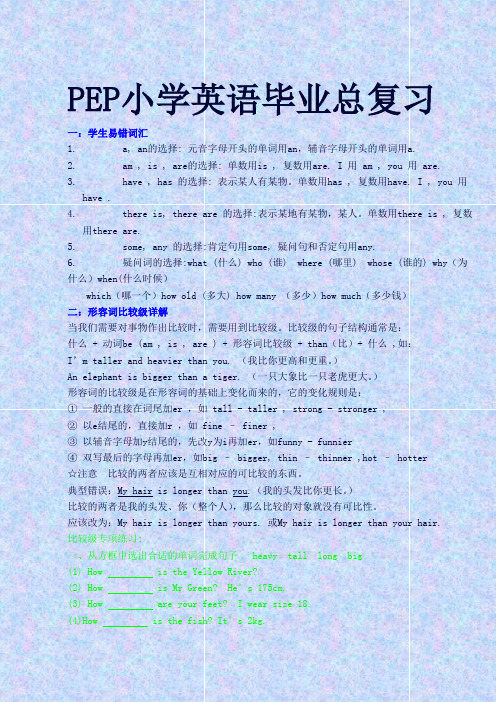
PEP小学英语毕业总复习一:学生易错词汇1. a, an的选择: 元音字母开头的单词用an,辅音字母开头的单词用a.2. am , is , are的选择: 单数用is , 复数用are. I 用 am , you 用 are.3. have , has 的选择: 表示某人有某物。
单数用has , 复数用have. I , you 用have .4. there is, there are 的选择:表示某地有某物,某人。
单数用there is , 复数用there are.5. some, any 的选择:肯定句用some, 疑问句和否定句用any.6. 疑问词的选择:what (什么) who (谁) where (哪里) whose (谁的) why(为什么)when(什么时候)which(哪一个)how old (多大) how many (多少)how much(多少钱)二:形容词比较级详解当我们需要对事物作出比较时,需要用到比较级。
比较级的句子结构通常是:什么 + 动词be (am , is , are ) + 形容词比较级 + than(比)+ 什么 ,如:I’m taller and heavier than you. (我比你更高和更重。
)An elephant is bigger than a tiger. (一只大象比一只老虎更大。
)形容词的比较级是在形容词的基础上变化而来的,它的变化规则是:①一般的直接在词尾加er ,如 tall - taller , strong - stronger ,②以e结尾的,直接加r ,如 fine – finer ,③以辅音字母加y结尾的,先改y为i再加er,如funny - funnier④双写最后的字母再加er,如big – bigger, thin – thinner ,hot – hotter☆注意比较的两者应该是互相对应的可比较的东西。
最新最全pep小学英语毕业总复习

最新最全pep小学英语毕业总复习复习一单词、句子、语法字母:( 注:五个元音字母是ΑαEe Ii Oo Uu ,21个辅音字母是Bb Cc Dd Ff Gg Hh Jj Kk Ll Mm Nn Pp Qq Rr Ss Tt Vv Ww Xx Yy Zz )按顺序写26个字母,看谁写得又快又漂亮:一:学生易错词汇1. α, αn的选择: 用于以元音音素(音标)开头的单词前用αn,用于以辅音音素(音标)开头的单词前用α.例子:This is αteαcher. This is αn αpple. She is αuniversity student.2. αm , is , αre的选择: 单数用is , 复数用αre. I 用αm , you 用αre.例子:She is αteαcher. They αre teαchers. You αre αstudent. I αm αteαcher.3. hαve , hαs 的选择: 表示某人有某物。
单数用hαs , 复数用hαve. I ,you 用hαve . 例子:I hαve αpen. She hαs αpen. They hαve mαny pens. You hαve αpen.4. there is, there αre 的选择:表示某地有某物,某人。
单数用there is , 复数用there αre.例子:There is pen on the desk. There αre mαny pens on the desk.5. some, αny 的选择:肯定句用some, 疑问句和否定句用αny.例子:There αre some boys in the clαssroom.There αre not αny boys in the clαssroom.Αre there αny boys in the clαssroom?6.like后加动词ing形式,cαn后面加动词原形。
pep小学英语六年级毕业总复习资料

pep小学英语六年级毕业总复习资料PEP小学英语毕业总复一、易错词汇1.选择a或an:以元音音素开头的单词用an,如:an ant/egg/ice-XXX;以辅音音素开头的单词用a。
2.选择am、is或are:单数用is,复数用are,I用am,you用are。
3.选择have或has:表示某人有某物,单数用has,复数用have,I/you用have。
例如:I/you/we have many books,he/she has many books。
4.选择there is或there are:表示某地有某物或某人,单数用there is,复数用there are。
例如:There is a bed in the bedroom,there are some/many books on the desk,are there any books on the desk?5.选择some或any:肯定句用some,疑问句和否定句用any。
6.疑问词的选择:what(什么)、who(谁)、where(哪里)、why(为什么)、when(什么时候)、how(如何)、which(哪一个)、how old(多大)、how many(多少)、how much(多少钱/多少)、whose(谁的)。
二、形容词比较级详解比较级的句子结构通常是:主语+ be动词(am/is/are)+形容词比较级+than(比)+比较对象。
例如:I'm taller and heavier than you(我比你更高和更重)、XXX(一只大象比一只老虎更大)。
形容词的比较级是在形容词的基础上变化而来的,它的变化规则是:1.一般的直接在词尾加-er,如tall - taller,strong - stronger。
2.以-e结尾的,直接加-r,如fine–finer。
3.以辅音字母加y结尾的,先改y为i再加-er,如funny - funnier,heavy--heavier。
小学英语毕业总复习(打印版)

小学英语知识总复习一:学生易错词汇1. a, an的选择: 元音字母开头的单词用an,辅音字母开头的单词用a.2. am , is , are的选择: 单数用is , 复数用are. I 用am , you 用are.3. have , has 的选择: 表示某人有某物。
单数用has , 复数用have. I ,you 用have .4. there is, there are 的选择:表示某地有某物,某人。
单数用there is , 复数用there are.5. some, any 的选择:肯定句用some, 疑问句和否定句用any.6. 疑问词的选择:what (什么) who (谁) where (哪里) whose (谁的) why(为什么)when(什么时候)which(哪一个)how old (多大) how many (多少)how much(多少钱)二:形容词比较级详解当我们需要对事物作出比较时,需要用到比较级。
比较级的句子结构通常是:什么+ 动词be (am , is , are ) + 形容词比较级+ than(比)+ 什么,如:I’m taller and heavier than you. (我比你更高和更重。
)An elephant is bigger than a tiger. (一只大象比一只老虎更大。
)形容词的比较级是在形容词的基础上变化而来的,它的变化规则是:①一般的直接在词尾加er ,如tall - taller , strong - stronger ,②以e结尾的,直接加r ,如fine – finer ,③以辅音字母加y结尾的,先改y为i再加er,如funny - funnier④双写最后的字母再加er,如big – bigger, thin – thinner ,hot – hotter☆注意☆比较的两者应该是互相对应的可比较的东西。
典型错误:My hair is longer than you.(我的头发比你更长。
(完整版)小学英语毕业总复习资料

小学英语毕业总复习资料有关的词汇人称(I,you…)、动物、交通工具、颜色、家庭成员、日常用品、身体部位、数词、衣服鞋袜、国名、形容词(描述外形特征的词)、动词(表示行为动作的词)、方位介词(前后上下……)主食(饭,面包,面条,蛋糕…)、水果、饮料、疑问词(wh-开头的词语)……话题关于姓名的对话、询问年龄、关于颜色、关于爱好、关于拥有(×××有……)、关于问好、打招呼、关于选择、指向(如:这是……?)、问数量、问来自哪里、问“你在做什么”、问价格、问能力(Can you…)、问出行方式、提出请求(如:May I have…?)、命令与禁止、问是谁、问是谁的、提建议(Let’s…)、问最喜欢的动物是什么以及书上的有关对话等等☆时态☆小学阶段一共学了四种时态,分别是:一般现在时,一般将来时,现在进行时,一般过去时。
句式there be、have got、祈使句和感叹句。
一、国际音标[p] [t] [d] [k] [ɡ] [f] [v] [ʃ] [tʃ] [s] [z] [ʒ] [dʒ] [tr] [dr] [ts] [dz] [θ] [ð] [h] [m] [n] [ŋ] [l] [r] [w] [j] [i:] [e] [æ] [ə:] [ə] [a:] [ʌ] [u:] [u] [ɔ:] [ɔ][ai] [ei] [ɔi] [iə] [ɛə] [uə] [au] [ əu]二、字母1、英语的26个字母中有5个元音字母和一个半元音字母。
2、元音字母:Aa、Ee、Ii、Oo、Uu。
半元音字母:Yy。
3、按照相同元音音素进行归类为:4、字母的大写1)英语中句子第一个词首字母要大写。
2)人名中姓和名的首字母要大写。
3)国家、城市、乡、镇等地名的首字母要大写。
4)民族的首字母要大写。
5)植物或称呼的首字母要大写。
6)专有名词的首字母要大写。
7)表示“我”的单词“I”永远大写。
人教版小学英语毕业总复习知识点汇总(适用于各种版本的教材)
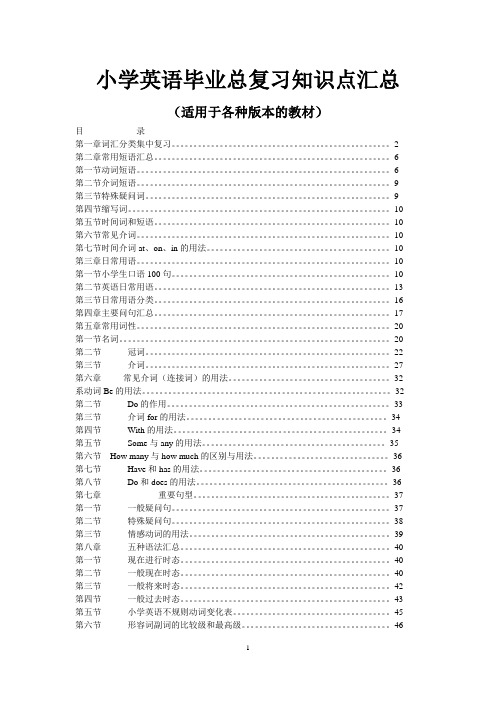
小学英语毕业总复习知识点汇总(适用于各种版本的教材)目录第一章词汇分类集中复习。
2 第二章常用短语汇总。
6 第一节动词短语。
6 第二节介词短语。
9 第三节特殊疑问词。
9 第四节缩写词。
10 第五节时间词和短语。
10 第六节常见介词。
10 第七节时间介词at、on、in的用法。
10 第三章日常用语。
10 第一节小学生口语100句。
10 第二节英语日常用语。
13 第三节日常用语分类。
16 第四章主要问句汇总。
17 第五章常用词性。
20 第一节名词。
20 第二节冠词。
22 第三节介词。
27 第六章常见介词(连接词)的用法。
32 系动词Be的用法。
32 第二节Do的作用。
33 第三节介词for的用法。
34 第四节With的用法。
34 第五节Some与any的用法。
35 第六节How many与how much的区别与用法。
36 第七节Have和has的用法。
36 第八节Do和does的用法。
36 第七章重要句型。
37 第一节一般疑问句。
37 第二节特殊疑问句。
38 第三节情感动词的用法。
39 第八章五种语法汇总。
40 第一节现在进行时态。
40 第二节一般现在时态。
40 第三节一般将来时态。
42 第四节一般过去时态。
43 第五节小学英语不规则动词变化表。
45 第六节形容词副词的比较级和最高级。
461第七节几种时态的构成汇总。
47第九章方位的表达方式。
48第一节交通工具及,规则,。
48第二节英语中方位的表达方式。
49第十章句型转换方法归纳。
50第一节改为一般疑问句。
50第二节改为否定句。
50第三节对划线部分提问。
51第四节肯定句、否定句、一般疑问句和特殊疑问句。
51第五节其它需要注意点。
52第十一章小学英语谚语集锦。
52第十二章写作。
55第一节分类写作指导。
55第二节命题作文。
58第三节话题作文。
62第一章词汇分类集中复习一、学习用品pen钢笔pencil铅笔pencil-case铅笔盒ruler尺子eraser橡皮comic book漫画书schoolbag书包crayon蜡笔Chinese book语文书notebook笔记本dictionary词典bag包magazine杂志story-book故事书newspaper报纸sharpener卷post card明信片English book英语书math book数学书book书二、人体foot脚head头face脸hair头发nose鼻子finger手指leg腿tail尾巴mouth嘴eye眼睛ear耳朵arm手臂hand手三、颜色red红blue蓝yellow黄green绿white白pink粉红purple紫orange 橙brown棕black黑四、动物cat猫dog狗pig猪duck鸭rabbit兔horse马elephant大象fish鱼bird鸟eagle鹰snake蛇mouse老鼠ant蚂蚁beaver海狸bear熊donkey驴goose鹅deer鹿monkey猴goat山羊squirrel 松鼠panda熊猫lion狮子tiger老虎fox狐狸zebra斑马hen母鸡giraffe长颈鹿turkey火鸡lamb小羊sheep绵羊cow奶牛squid鱿鱼lobster龙虾shark鲨鱼seal海豹sperm whale抹香鲸killer whale虎鲸kangaroo袋鼠五、人物friend朋友boy男孩girl女孩mother母亲father父亲sister姐妹brother兄弟man男人uncle叔叔;舅舅woman女人Mr。
(完整word版)小学英语毕业总复习知识点汇总全册(word文档良心出品)
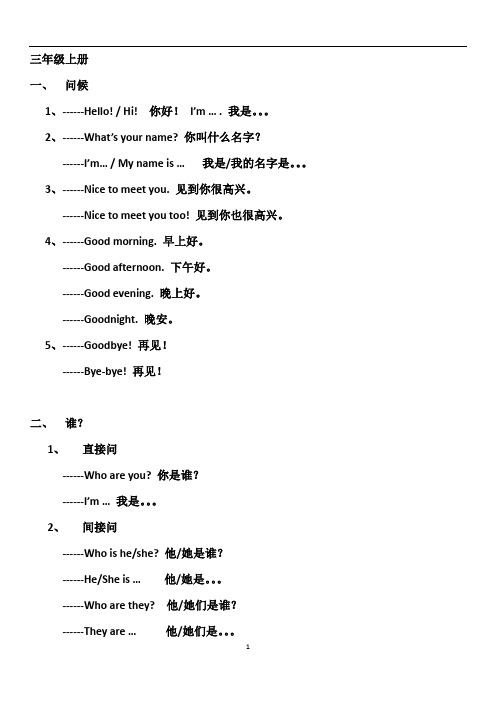
三年级上册一、问候1、------Hello! / Hi! 你好!I’m … . 我是。
2、------What’s your name? 你叫什么名字?------I’m… / My name is …我是/我的名字是。
3、------Nice to meet you. 见到你很高兴。
------Nice to meet you too! 见到你也很高兴。
4、------Good morning. 早上好。
------Good afternoon. 下午好。
------Good evening. 晚上好。
------Goodnight. 晚安。
5、------Goodbye! 再见!------Bye-bye! 再见!二、谁?1、直接问------Who are you? 你是谁?------I’m …我是。
2、间接问------Who is he/she? 他/她是谁?------He/She is …他/她是。
------Who are they? 他/她们是谁?------They are …他/她们是。
三、选择疑问句(是不是?)○1直接问------Are you …? 你是。
吗?------Yes, I am. / No, I’m not. 是,我是。
/ 不,我不是。
○2间接问------Is he/she …? 他/她是。
吗?------Yes, he/she is. / No, he/she isn’t. 是,他/她是。
/ 不,他/她不是。
------Are they …? 他/她们是。
吗?------Yes, they are. / No, they aren’t. 是,他们是。
/ 不,他们不是。
四、介绍(This is …)○1介绍家庭成员------This is my family. 这是我的家庭。
○2提问------Is this your family?这是你的家庭吗?------Yes, it is. / No, it isn’t. 是,它是。
小学英语知识点总复习资料

小学英语毕业总复习资料一:易错词汇1. a,an的选择: 元音字母开头的单词用an,辅音字母开头的单词用a。
2。
am ,is , are的选择: 单数用is , 复数用are. I 用am ,you 用are.3. have ,has 的选择:表示某人有某物。
单数用has ,复数用have。
I ,you 用have 。
4。
there is, there are 的选择:表示某地有某物,某人。
单数用there is ,复数用there are。
5. some, any 的选择:肯定句用some,疑问句和否定句用any。
6。
疑问词的选择:what (什么)who (谁) where (哪里) whose (谁的)why(为什么)when(什么时候)which(哪一个)how old (多大)how many (多少)how much(多少钱)专项练习(一)用“have,has”or “there is ,there are”填空1. I________a good father and a good mother。
2。
____________a telescope on the desk.3。
He_________a tape-recorder。
4。
_____________a basketball in theplayground。
5. She__________some dresses。
6. They___________a nice garden。
7. What do you___________?8。
______________a reading-room in thebuilding?9. What does Mike___________? 10。
______________any books in the bookcase?11。
My father_________a story-book. 12。
小学毕业班英语总复习

一、按疑问词来分WhatWhat’s your name?What’s in the picture/ your schoolbag/ your pencil-case/ the classroom?What do you like?What’s your father?What would you like?What’s this?What’s his /her name?What about you?What are you going to do after school/ this weekend/ this evening /this afternoon?What are you going to buy?What does he like to do?What’s your hobby?What does she/ he /your father/ your mother do?What are you going to be?What should we do then?What time is it?What does she do?What colour is it?What are they?What are you doing?What’s the weather like in Beijing? What’s the matter?What size?What do you see in the picture? What are these?What do you do on the weekend? What’s your favourite season? What’s the weather like in spring? What would you like to do/eat? What is Zip’s favourite season? What’s the date today?What are they?What’s she doing?What are they doing?What is it doing?What are the ducks doing?What do ants like to eat?What do you have?What are you reading?What’s th at?What do you do when you have the flu?What did you buy?What did you do last weekend?What about grapes?What do you want to do?What’s in that tiny seed?What can Mike do in the four seasons in Canada? What’s he/she/it like?What day is it today?What do you have on Thursday?What do you do on weekends?What’s your favourite day/food/fruit?What can you /he /she /it do?HowHow are you?How about you?How old are you?How many candles balloons /books /gifts are there? How do you go to school /Canada?How about by taxi?How can I get to Zhongshan。
(完整版)最新版PEP小学英语毕业总复习资料(最新整理)
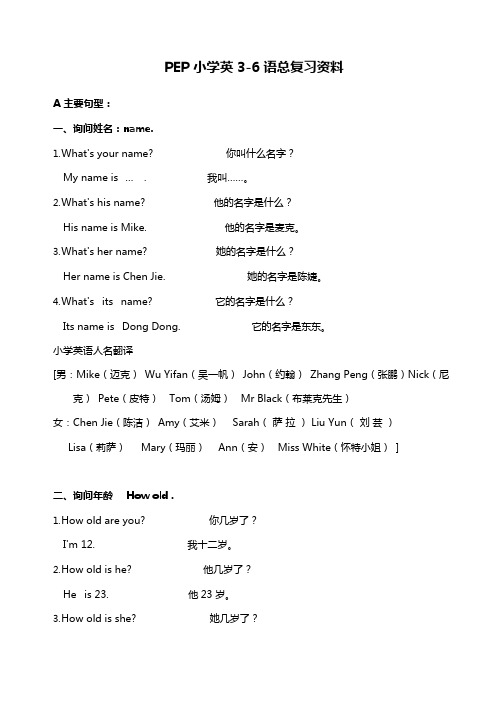
PEP 小学英 3-6 语总复习资料A 主要句型:一、询问姓名:name.1.W hat's your name? 你叫什么名字?My name is …. 我叫……。
2.W hat's his name? 他的名字是什么?His name is Mike. 他的名字是麦克。
3.W hat's her name? 她的名字是什么?Her name is Chen Jie. 她的名字是陈婕。
4.W hat's its name? 它的名字是什么?Its name is Dong Dong. 它的名字是东东。
小学英语人名翻译[男:Mike(迈克)Wu Yifan(吴一帆)John(约翰)Zhang Peng(张鹏)Nick(尼克)Pete(皮特)Tom(汤姆)Mr Black(布莱克先生)女:Chen Jie(陈洁)Amy(艾米)Sarah(萨拉) Liu Yun(刘芸)Lisa(莉萨)Mary(玛丽)Ann(安)Miss White(怀特小姐)]二、询问年龄How old .1.H ow old are you? 你几岁了?I'm 12. 我十二岁。
2.H ow old is he? 他几岁了?He is 23. 他 23 岁。
3.H ow old is she? 她几岁了?She is 20. 她 20 岁。
[数字词汇:one 一two 二three 三four 四five 五six 六seven 七eight 八nine 九ten 十eleven 十一twelve 十二thirteen 十三fourteen 十四fifteen 十五 sixteen 十六seventeen 十七eighteen 十八nineteen 十九twenty 二十thirty 三十forty 四十fifty 五十sixty 六十seventy 七十eighty 八十ninety 九十hundred 百]三、询问颜色:colour1.W hat colour is it? 它是什么颜色的?It's yellow and white. 黄白相间。
小学英语毕业总复习单词分类
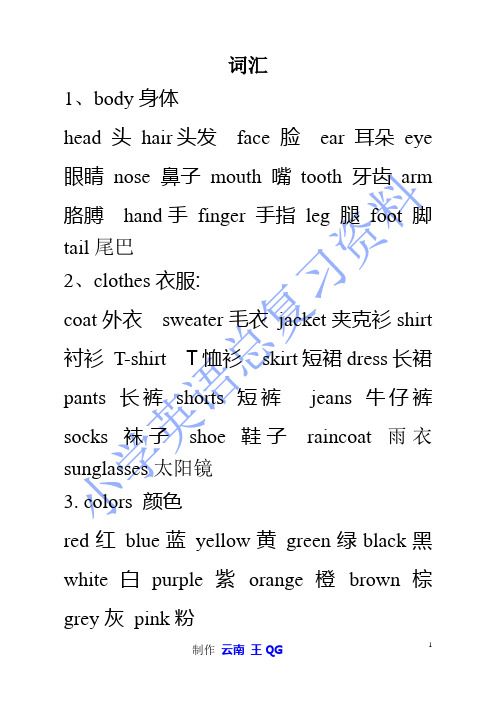
词汇1、body身体head头hair头发face 脸ear 耳朵eye 眼睛nose 鼻子mouth 嘴tooth 牙齿arm 胳膊hand手finger 手指leg 腿foot脚tail尾巴2、clothes衣服:coat外衣sweater毛衣jacket夹克衫shirt 衬衫T-shirt T恤衫skirt短裙dress长裙pants长裤shorts短裤jeans牛仔裤socks袜子shoe鞋子raincoat雨衣sunglasses太阳镜3. colors 颜色red红blue蓝yellow黄green绿black黑white白purple紫orange橙brown棕grey灰pink粉4. jobs职业teacher教师student学生doctor医生nurse 护士driver司机farmer农民singer歌唱家writer作家actor男演员actress女演员artist画家TV reporter电视台记者engineer 工程师accountant会计policeman(男)警察salesperson销售员cleaner清洁工baseball player棒球运动员assistant售货员police 警察5、weather天气hot 炎热cold 寒冷warm暖和cool凉爽sunny 晴天rainy 雨天snowy 雪天windy 刮风天cloudy 多云weather report天气预报6、season季节:Spring春天Summer夏天Fall Autumn 秋天Winter 冬天7、month月份:January一月February二月March三月April四月May五月June 六月July 七月August 八月September九月October十月November十一月December十二月8、week星期:Monday星期一Tuesday星期二Wednesday星期三Thursday星期四Friday星期五Saturday星期六Sunday 星期天9. food食品breakfast早餐lunch午餐dinner/supper晚餐noodles面条rice米饭meat肉soup汤bread面包beef牛肉pork猪肉mutton羊肉chicken鸡肉fish鱼milk牛奶egg蛋tofu 豆腐cake蛋糕hot dog热狗hamburger汉堡包French fries炸薯条10. drink 饮料water水ice-cream冰淇淋Coke可乐juice果汁tea茶coffee咖啡11、fruitapple苹果banana香蕉pear梨strawberry 草莓grape葡萄orange橙watermelon西瓜peach桃12. vegetables 蔬菜eggplant茄子green beans青豆tomato西红柿potato土豆cucumber黄瓜onion洋葱carrot胡萝卜cabbage卷心菜13.family and people家庭人物grandparents祖父母grandma/grandmother (外)祖母grandpa/grandfather(外)祖父parents父母father父亲dad爸爸mother 母亲mom妈妈uncle叔叔aunt姑姑sister 姐妹brother兄弟cousin堂(表)兄弟;堂(表)姐妹son儿子daughter女儿baby 婴儿man男人Mr.先生woman女人lady 女士;小姐Miss小姐boy男孩girl女孩kid 小孩children classmate同学visitor 参观者neighbour邻居principal校长university student大学生pen pal笔友people人物robot机器人friend朋友14.(other things)杂物window窗户curtain窗帘door门desk课桌table桌子chair椅子bed床computer计算机board写字板fan风扇light灯teacher's desk讲台picture图画;照片wall墙壁floor地板trash bin垃圾箱closet壁橱mirror镜子end table床头柜football足球present礼物walkman随身听lamp台灯phone电话sofa沙发shelf书架fridge冰箱TV电视air-conditioner空调key钥匙lock锁photo照片plate盘子knife刀fork 叉spoon勺子chopsticks筷子pot锅gift 娃ball球kite风筝box盒子umbrella伞violin小提琴menu菜单e-card电子卡片e-mail电子邮件traffic light交通灯money 钱medicine药15. 地点east东west西south南north北left 左边right右边home家room房间bedroom卧室bathroom卫生间living room起居室kitchen厨房study书房school学校classroom教室playground操场canteen食堂garden花园teacher's office教师办公室library图书馆gym体育馆washroom卫生间art room绘画教室computer room计算机教室music room音乐教室TV room电视机房country国家village乡村city城市hometown家乡park公园nature park自然公园theme park主题公园library图书馆post office邮局police office(station)警察局hospital医院cinema电影院bookstore书店farm农场zoo动物园company公司factory 工厂fruit stand水果摊pet shop宠物商店science museum科学博物馆supermarket超市bank银行bus stop公交车站the Great Wall长城16.出行train火车subway地铁car小汽车bus公共汽车taxi出租车plane飞机motor cycle 摩托车bike自行车ship轮船boat小船foot(脚)17. 国家China(PRC)中国America(USA)美国England(UK)英国Japan(JAP)日本Canada (CAN)加拿大Australia 澳大利亚18、nature景物river河流lake湖泊stream河;溪forest 森林path小道road公路house房子bridge桥building建筑物rain雨cloud云sun太阳mountain山sky天空rainbow彩虹wind风air空气moon月亮19.animals动物cat猫dog狗pig猪duck鸭rabbit兔snake 蛇bird鸟fish鱼horse马mouse老鼠elephant 大象ant蚂蚁kangaroo袋鼠panda熊猫bear熊lion狮子tiger老虎fox狐狸zebra 斑马deer鹿giraffe长颈鹿goose鹅hen 母鸡lamb小羊sheep绵羊goat山羊cow 奶牛monkey猴donkey驴20、植物(plants)flower花grass草rose玫瑰plant植物tree树seed种子leaf叶子21. numbers数词one一two二three三four四five五six 六seven七eight八nine九ten十eleven 十一twelve十二thirteen十三fourteen十四fifteen十五sixteen十六seventeen十七eighteen十八nineteen十九twenty二十thirty三十forty四十fifty五十sixty六十seventy七十eighty八十ninety九十forty-two四十二hundred百one/a hundred and thirty-six一百三十六first second third fourth fifth sixth seventh eighth ninth tenth eleventh twelfth thirteenth fourteenth22.school thingspen (钢笔)pencil (铅笔)pencil-case ( 铅笔盒)ruler(尺)Eraser(橡皮)crayon(蜡笔)book (书)bag (书包)sharpener (卷笔刀) comic book(漫画书)post card明信片newspaper(报纸)magazine (杂志)Chinese book English book(英语书)math book(数学书)story-book(故事书) notebook(笔记本)23. 课程(classes)Chinese(语文)math(数学)science科学English(英语)P.E.(体育)Moral Education 思想品德课Social Studies社会课music(音乐) computer (电脑)24.动词及短语play玩;踢swim游泳skate滑冰fly飞jump跳walk走run跑climb爬fight打架swing荡eat吃sleep睡觉like像,喜欢have有;吃turn转弯buy买take买;带live居住teach教go去study学习learn 学习sing唱歌dance跳舞row划do做meet见面welcome欢迎love爱drink喝look看guess猜help帮助pass传递show 展示use使用clean打扫wear穿open打开close关上put放tell告诉ride骑think想,思考fall落下leave离开do homework做作业do housework做家务do morning exercises晨练do the dishes洗碗碟do an experiment做实验go to school上学go hiking去远足,去郊游go home回家go to bed上床睡觉go straight向前直走go shopping买东西go to the cinema去看电影watch TV看电视read books读书cook the meals做饭water the flowers浇花sweep the floor扫地clean the bedroom打扫卧室make the bed铺床set the table摆饭桌wash the clothes洗衣服use a computer使用计算机;做广播操eat breakfast吃早饭have dinner吃晚饭eat vegetable have English class上英语课play sports进行体育运动get up起床climb mountains爬山play the piano弹钢琴visit grandparents看望(外)祖父母fly kites放风筝make a snowman堆雪人plant trees种树draw pictures画画cook dinner做饭read a book看书answer the phone接电话listen to music听音乐clean the room打扫房间write a letter写信write an e-mail写电子邮件drink water喝水take pictures照相watch insects观察昆虫pick up leaves采摘树叶catch butterflies捉蝴蝶count insects数昆虫collect insects收集昆虫collect leaves收集树叶write a report写报告play chess下棋have a picnic 举行野餐get to到达ride a bike骑自行车play the violin拉小提琴make kites制作风筝collect stamps集邮wake up醒来wear 穿play computer games玩电脑游戏play chess下棋empty the trash倒垃圾put away the clothes收拾衣服take a trip去旅行read a magazine阅读杂志put on穿上take off脱掉get on 上车get off下车turn on打开turn off关掉25.疑问代词where when why who whom whose how many ,how much ,how old ,how tall, how heavy, how big, how large ,how long, what, what color, what day26.形容词big 大的small 小的cheap 便宜的expensive 贵的long 长的short 短的fat 胖的thin瘦的old 老的young 年青的beautiful漂亮的pretty可爱的strong 强壮的quiet 安静的cute 漂亮的lovely 可爱的tall 高的funny 有趣的kind 慈祥的strict 严格的smart 机灵的active 活跃的new 新的tired疲劳的,累的excited兴奋的happy高兴的angry生气的bored无聊的,烦人的sad 忧伤的,悲伤的tasty 美味sweet 甜sour 酸salty 咸colourful 多彩的fresh 新鲜的right对的hungry饥饿的helpful有帮助的high高的easy简单的sick有病的favourite最喜爱的clean干净的nice好看的。
小学英语毕业考总复习重点(人教版PEP)

小学英语毕业考总复习重点(新人教版教材PEP)1.-Where is the cinema?(电影院在哪里?)-next to the bookstore、)-Where is the science museum?(科学博物馆在哪里?)-near the library、)2.-How can I get to the science museum?(我要怎样才能到科学博物馆?)、(在学校左转。
然后直走。
)(我们要怎样才能到那里?)、、(到书店左转。
然后走到医院右转。
)3.-How do you go to school?(您怎样去学校?)-I go to school by subway(我乘地铁去上学。
)-How do you come to school?(您怎样来学校?)-I come to school on foot(我走路来上学。
)-How do we get there?(我们怎样到那儿?)/ We get there by bus(我们坐公交车到那儿。
)4.-What are you going to do tomorrow?(您明天打算干什么?)-I’m going to (我打算去瞧场电影。
)-What are you going to buy?(您打算去买什么?)-I’(我打算去买几本词汇书。
)-What are they going to do next week?(她们周末打算干什么?)-They are going to take a trip(她们打算去旅游。
)-What is he going to do today?(她今天打算干什么?)-He is going to wash clothes(她打算洗衣服。
)-What is she going to do this afternoon?(她今天下午打算干什么?)-She is going to sleep、(她打算睡觉。
小学英语毕业总复习全册知识点汇总

小学英语毕业总复习全册知识点汇总PEP小学英语语法要点及习题一、★名词复数规则1.一般情况下,直接加-s,如:book-books, bag-bags, cat-cats, bed-beds2.以s. x. sh. ch结尾,加-es,如:bus-buses, box-boxes, brush-brushes, watch-watches3.以“辅音字母+y”结尾,变y为i, 再加-es,如:family-families, strawberry-strawberries4.以“f或fe”结尾,变f或fe为v, 再加-es,如:knife-knives5.不规则名词复数:man-men, woman-women, policeman-policemen, policewoman-policewomen, mouse-mice child-children foot-feet,. tooth-teeth fish-fish, people-people, Chinese-Chinese, Japanese-Japanese二、一般现在时一般现在时基本用法介绍【No. 1】一般现在时的功能1.表示事物或人物的特征、状态。
如:The sky is blue.天空是蓝色的。
2.表示经常性或习惯性的动作。
如:I get up at six every day.我每天六点起床。
3.表示客观现实。
如:The earth goes around the sun.地球绕着太阳转。
一般现在时的构成1. be动词:主语+be(am,is,are)+其它。
如:I am a boy.我是一个男孩。
2.行为动词:主语+行为动词(+其它)。
如:We study English.我们学习英语。
当主语为第三人称单数(he, she,it)时,要在动词后加"-s"或"-es"。
如:Mary likes Chinese.玛丽喜欢汉语。
人教版PEP小学六年级英语毕业总复习(词汇、语法、句型、题型、单词、更多)

Whose skirt is this? It’s Amy’s.
Why do you like spring best? Because I can plant trees.
How are you? I’m fine. / I’m happy.
How did you go to Xinjiang? I went to Xinjiang by train.
② e d lived , danced , used
③ y y i ed
study – studied carry – carried worry – worried play stay y,
④
stopped
sing – sang , eat – ate ,
see – saw , have – had , do – did , go – went , take – took , buy – bought , get – got , read – read ,fly – flew , am/is – was ,
.
(1)
. I’m____________than my brother.
(2)
. This tree____________ than that one.
(3) . You are____________ than he.
(4) ?____________________________________than you
(1) I’m 12 years old. You’re 14. I’m____________ than you. (2) A rabbit’s tail is____________ than a monkey’s tail. (3) An elephant is____________ than a pig. (4) A lake is____________ than a sea. (5) A basketball is____________ than a football.
- 1、下载文档前请自行甄别文档内容的完整性,平台不提供额外的编辑、内容补充、找答案等附加服务。
- 2、"仅部分预览"的文档,不可在线预览部分如存在完整性等问题,可反馈申请退款(可完整预览的文档不适用该条件!)。
- 3、如文档侵犯您的权益,请联系客服反馈,我们会尽快为您处理(人工客服工作时间:9:00-18:30)。
pep小学英语毕业总复习一:学生易错词汇1. a, an的选择: 元音字母开头的单词用an,辅音字母开头的单词用a.2. am , is , are的选择: 单数用is , 复数用are. I 用 am , you 用 are.3. have , has 的选择: 表示某人有某物。
单数用has , 复数用have. I ,you 用 have .4. there is, there are 的选择:表示某地有某物,某人。
单数用there is , 复数用there are.5. some, any 的选择:肯定句用some, 疑问句和否定句用any.6.疑问词的选择:what (什么) who (谁) where (哪里) whose (谁的) why(为什么)when(什么时候)which(哪一个)how old (多大) how many (多少)how much(多少钱)二:形容词比较级详解当我们需要对事物作出比较时,需要用到比较级。
比较级的句子结构通常是:什么 + 动词be (am , is , are ) + 形容词比较级 + than(比)+ 什么 ,如:I’m taller and heavier than you. (我比你更高和更重。
)An elephant is bigger than a tiger. (一只大象比一只老虎更大。
)形容词的比较级是在形容词的基础上变化而来的,它的变化规则是:①一般的直接在词尾加er ,如 tall - taller , strong - stronger ,②以e结尾的,直接加r ,如 fine – finer ,③以辅音字母加y结尾的,先改y为i再加er,如funny - funnier④双写最后的字母再加er,如big – bigger, thin – thinner ,hot – hotter☆注意☆比较的两者应该是互相对应的可比较的东西。
典型错误:My hair is longer than you.(我的头发比你更长。
)比较的两者是我的头发、你(整个人),那么比较的对象就没有可比性。
应该改为:My hair is longer than yours. 或My hair is longer than your hair.比较级专项练习: 一、从方框中选出合适的单词完成句子 heavy tall long big(1) How is the Yellow River?(2) How is Mr Green? He’s 175cm.(3) How are your feet? I wear size 18.(4)How is the fish? It’s 2kg.二、根据句意写出所缺的单词(1) I’m 12 years old. You’re 14. I’m than you.(2) A rabbit’s tail is than a monkey’s tail.(3) An elephant is than a pig.(4) A lake is than a sea.(5) A basketball is than a football.三、根据中文完成句子.(1)我比我的弟弟大三岁. I’m than my brother.(2)这棵树要比那棵树高. This tree than that one.(3)你比他矮四厘米. You are than he.(4)谁比你重? than you?四、根据答句写出问句(1) I’m 160 cm.(2) I’m 12 years old.(4) Amy’s hair is 30 cm long.三:动词过去式详解动词的过去式的构成规则有:A、规则动词①一般直接在动词的后面加ed:如worked , learned , cleaned , visited②以e结尾的动词直接加d:如lived , danced , used③以辅音字母加y结尾的动词要改y为i再加ed(此类动词较少)如study – studied carry –carried worry – worried (注意play、stay不是辅音字母加y,所以不属于此类)④双写最后一个字母(此类动词较少)如stoppedB、不规则动词(此类词并无规则,须熟记)小学阶段要记住以下动词的原形和过去式:sing – sang , eat – ate ,see – saw , have – had , do – did , go – went , take – took , buy – bought , get –got , read – read ,fly – flew , am/is – was ,are – were , say – said , leave – left , swim – swam , tell – told , draw – drew , come – came , lose – lost , find – found , drink – drank , hurt – hurt , feel – felt四:动词现在分词详解动词的ing形式的构成规则:①一般的直接在后面加上ing , 如doing , going , working , singing , eating②以e 结尾的动词,要先去e再加ing ,如having , writing③双写最后一个字母的(此类动词极少)有:running , swimming , sitting , getting五:人称和数六:句型专项归类1、肯定句:是指用肯定的语气来陈述的句子,如:I’m a student. She is a doctor. He worksin a hospital.There are four fans in our classroom. He will eat lunch at 12:00. I watched TV yesterday evening.2、否定句:含有否定词或表示否定意义词的句子,如:I’m not a student. She is not (isn’t) a doctor.He does not (doesn’t) work in a hospital. There are not (aren’t) four fans in our classroom.He will not (won’t) eat lunch at 12:00. I did not (didn’t) watch TV yesterday evening. ☆注意☆小结:否定句主要是在肯定句的基础上加上了否定词“not”。
有动词be的句子则“not”加在be后面,可缩写成“isn’t,aren’t”,但am not 一般都分开写。
没有动词be的句子则要先在主要动词的前面加上一个助动词(do,does,did),然后在它后面加上“not”,你也可以把它们缩写在一起如“don’t , doesn’t , didn’t )。
这三个助动词要根据人称和时态来选择,其中“does”只用于一般现在时主语是第三人称单数的情况,而“did”只用于一般过去时,不论主语是什么人称和数,都用“did”。
3、一般疑问句:是指询问事实的句子,此类句子必须用“yes”,或“no”来回答。
如:Are you a student? Yes, I am / No, I’m not.Is she a doctor? Yes, she is. / No, she isn’t.Does he work in a hospital? Yes, he does. / No, he doesn’t.Are there four fans in our classroom? Yes, there are. / No, there aren’t.Are you going to buy a comic book tonight? Yes, I am. / No, I am not. (Yes, we are. / No, we aren’t.)Will he eat lunch at 12:00? Yes, I will. / No, I will not(won’t).Are they swimming? Yes, they are. / No, they aren’t.Did you watch TV yesterday evening? Yes, I did. / No, I didn’t.☆注意☆小结:一般疑问句是在肯定句的基础上,①把动词be调到首位,其他照写,末尾标点符号变成问号即可。
②没有动词be的句子则要在句首加上一个助动词(do,does,did)再把紧跟在后面的动词变回原形,末尾标点符号变成问号即可。
这三个助动词也要根据人称和时态来选择,其中“does”只用于一般现在时主语是第三人称单数的情况,而“did”只用于一般过去时,不论主语是什么人称和数,都用“did”。
一般疑问句有个重要的原则就是问和答要一致,即问句里的第一个单词(助动词)和简略答句里的这个词是一致的。
4、特殊疑问句:以特殊疑问词(what , where , who , which , when , whose , why , how等)开头引导的句子。
此类句子应该问什么就答什么,不能用“yes 、no”来回答。
如:What is this? It’s a computer.What does he do? He’s a doctor.Where are you going? I’m going to Beijing.Who played football with you yesterday afternoon? Mike.Which season do you like best? Summer.When do you usually get up? I usually get up at 6:30.Whose skirt is this? It’s Amy’s.Why do you like spring best? Because I can plant trees.How are you? I’m fine. / I’m happy.How did you go to Xinjiang? I went to Xinjiang by train.☆其中how又可以和其他一些形容词连用组成特殊疑问词组用来提问,如: how many(多少(数量)), how much(多少(钱)), how tall(多高), how long(多长), how big(多大), how heavy(多重)例句:How many pencils do you have? I have three pencils.How many girls can you see? I can see four girls.How many desks are there in your classroom? There are 51.☆小结:how many 用来提问可数名词的数量,主要有以上三种句式搭配,How many + 名词复数 + do you have? 你有多少……?How many + 名词复数 + can you see? 你能看见多少……?How many + 名词复数 + are there…? 有多少……?七:完全、缩略形式: I’m=I am he’s=he is she’s=she is they’re=they are you’re=you are there’s=there is they’re=they are can’t=can not don’t=do not doesn’t=does not isn’t=is not aren’t=are not let’s=let us won’t=will not I’ll=I will wasn’t=was not总结:通常情况下,'m即am,'s即is(但 let’s=let us), 're即are,n't即not(但can’t=can not)八:与字母相关的题型 ( 注:五个元音字母是 Aa Ee Ii Oo Uu )一.将所给字母的大小写写在四线格上Hh Rr Xx Gg Mm Uu Zz Ff Qq Ii二.写出下列字母的左邻右舍。
